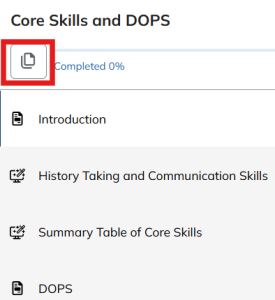Background
In 2024 The Core Skills List (CSL) was revised in conjunction with the development of the new RNZCUC Curriculum 2025. This revision has resulted in the editing or merging of some of the current skills and the addition of several new skills to the list to align with the curriculum learning outcomes. The curriculum learning outcomes have been mapped to both learning opportunities and assessment methods, which include where applicable, the CSL, Skills Demonstration and Assessment Weekend (SDAW) and Directly Observed Procedural Skill (DOPS) assessments.
Requirement
Unless granted an exemption for some or all of the skills, all registrars are required to have their skills assessed, and competence confirmed, before the exit interview and achieving Fellowship. This is done by completing the Core Skills Lists (CSL). Note that some of the core skills lists are DOPS.
For registrars on the pre-2025 training programme the revised list contains 40 skills including 2 new skills (pulled elbow relocation and doppler ultrasound for foetal heart). The 2025 training program list also contains an additional 2 skills (facial nerve blocks and TMJ relocation), making 42 in total.
The Core Skills are subdivided into,
- Examination skills
- Procedural skills
- Interpretation of Investigation skills
The CSL includes separate skills and procedures that urgent care doctors should be competent in performing. Each of the skills and procedures has an associated set of sub-skills.Each CSL describes the required level of competence for that skill for an urgent care doctor working in an urgent care clinic or emergency department. Many include expert techniques and pathognomonic signs which are specific to certain diseases or pathological processes, aiding the doctor on the diagnosis and/or disposition of the patient.
The core skills DO NOT include those taught and assessed on compulsory courses (Trauma, PALS/APLS, Communications, resuscitation).
Pre-2025 training programme requirements
For pre-2025 registrars completion of all 40 skills must occur before the exit interview and achieving Fellowship. This is done by completing the individual CSLs and uploading them to UCCIS. Pre-2025 registrars are not required to complete DOPS assessments / forms.
2025 training programme requirements
For 2025 registrars the new training programme structure mandates that different skills are assessed at the various stages of training.
- Basic Training
- All examination and investigation skills must be completed
- Minimum of 2 DOPS (see the DOPS page for the specific ones that must be completed).
- Advanced Training
- Remainder of the procedural skills
- Remaining DOPS (up to 6) (see the DOPS page).
Completing the Core Skills
Registrars have options for sign off of the core skills. They may ask their supervisor, other urgent care Fellows or relevant specialists (e.g orthopaedic surgeon for knee examination), attend the SDAW for some skills, or in some cases a senior nurse. Some core skills can be signed off at an urgent care fracture or soft tissue clinic. If the registrar would like to attend a DHB or private clinic in radiology, ENT, Ophthalmology, plastics, or orthopaedics, then the College would offer a letter of support.
On completion, the pages should be scanned and uploaded into your UCCIS TPS under the correct activity/sub-activity. Please retain the completed and signed pages.
The College recognises that not all core skills can be physically demonstrated on a patient. This is because it may not be possible to complete them in person as the condition does not occur frequently enough and/or it is not safe to perform this skill outside an emergency department. Some skills may also be discussed rather than performed due to privacy and consent issues.
Click here to view the core skills videos. You will need to click the ▷ symbol for the video to come up. The core skills lists are available on TalentLMS.
To view the core skills lists on Talent LMS, under the “Core Skills and DOPs” course, you will need to click the “files” icon (see below).
Sign-off instructions for specific cases
- Knee arthrocentesis – It can be performed under the direct supervision of the experienced supervisor with the patient consent for the right conditions, i.e. diagnostic aspiration for gout, synovitis and others. If concerned about septic arthritis and no immediate lab to test the aspiration, don’t do it and refer the patient to the hospital.
- Male catheter – This may be required to be performed on a dummy, given the infrequent nature of catheterisation in an Urgent Care Clinic or explain to the supervisor the steps the trainee will undertake to do the procedure.
- Nailbed injuries – It may be more appropriate to discuss, rather than perform, a nailbed repair. However, this is an important skill for an urgent care doctor to acquire, so it would be expected that the registrar demonstrates it on a dummy or ‘fake’ finger or explain to the supervisor the steps the trainee will undertake to do the procedure.
- Pelvic exam may be inappropriate to do with a supervisor to be signed off unless privacy and chaperone conditions are met. If it’s inappropriate, the supervisor discusses the exam technique with the registrar after the exam is done and seeks feedback from a nurse who is present at the exam.
- Senior nurses and charge nurses can also sign off appropriate clinical skills. These include applying splints, administering inhalers and nebuliser, and ECG placement. Cast application and cast checks are also suitable for senior nurse sign-off.
- Facial nerve blocks – will be taught at SDAW from 2026

